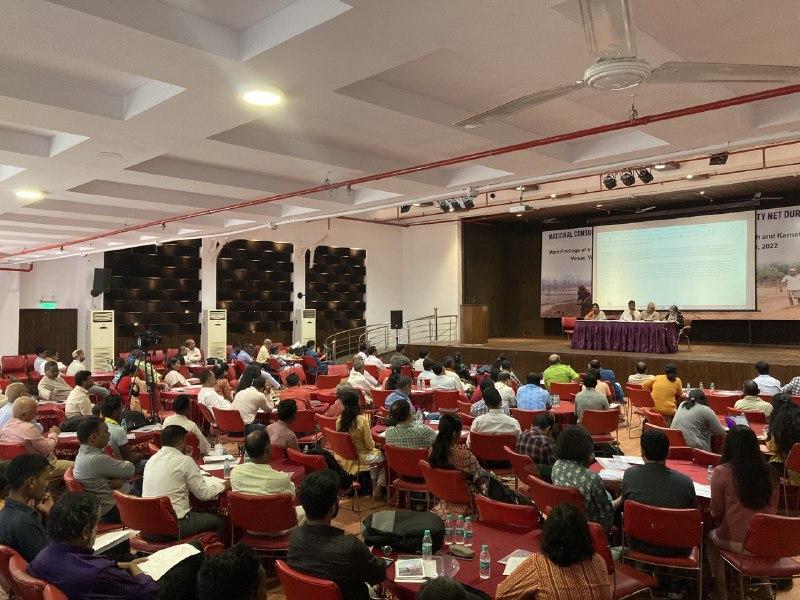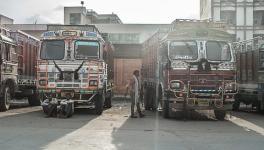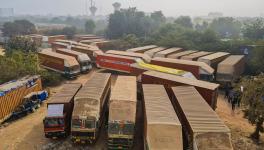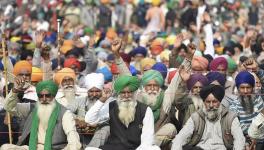Earnings From MGNREGA Compensated Loss of Income During COVID-19 Pandemic: Study

Conducted by Azim Premji University, a study report was released at an event in New Delhi on Thursday. Image clicked by Ronak Chhabra
New Delhi: The Mahatma Gandhi Rural Employment Guarantee Act (MGNREGA) scheme has made a “marked difference” in protecting rural households from significant loss of income during the COVID-19 pandemic, a latest study has found, prompting activists to demand “massive expansion” of the programme on Thursday.
Somewhere between 20-100% of the income lost from other sources was compensated through increased earnings from the scheme for the rural households who found work under it during the 2020-21 period and not before, revealed a joint study conducted by Azim Premji University in partnership with the National Consortium of Civil Society Organisations on NREGA and Collaborative Research and Dissemination (CORD).
The study, conducted after surveying 2,000 households across a total of eight blocks in Bihar, Karnataka, Madhya Pradesh, and Bihar, further found that the MGNREGA played a crucial role in softening the blow of the nationwide lockdown, even as roughly 39% of all the surveyed households, interested in working under the scheme during the pandemic year, could not get a single day of work.
Among households that found some work during the pandemic year, the unmet demand across all the blocks was found to be 64 days, according to the survey. Conducted in December last year, the survey results also show that the most frequently mentioned reason for not getting as much work as needed was the lack of adequate work being sanctioned under the scheme.
“Our study shows how much the workers value the need and utility of MGNREGA,” Rajendran Narayanan, co-author of the study and faculty member at Azim Premji University, said while releasing the study report at an event held in New Delhi on Thursday. Through the study, a “massive extent of underfunding” of the MGNREGA was also found, he added.
“A conservative estimate yields that the allocations in the surveyed blocks should have been three times the amount that was actually allocated in the year after lockdown to fulfil the true extent of work demand, Narayanan noted.
100 Days of Work for Every Individual Recommended
Crucially, more than eight in ten surveyed households recommended that MGNREGA should provide 100 days of wage employment per year to every individual, which the authors concluded as making a “very compelling and resounding case for the expansion” of the rural employment guarantee scheme.
As per the scheme, currently, work is provided to at least one member of every rural household whose adult member volunteers to do unskilled manual work.
Commenting on the findings of the study, Dipa Sinha, assistant professor of economics at Ambedkar University, said that despite not meeting the full demand, it is clear that MGNREGA played the role of a “safety net” for the rural households during the COVID-19 pandemic.
“On one hand, this is also a reminder of the extent of the catastrophe that would have happened had there been no MGNREGA. On the other hand, the findings also re-emphasise the need for a similar scheme for the urban areas, given the prevailing distress,” she said during a panel discussion.
Ashwini Kulkarni of the NREGA Consortium, while participating in the discussion, highlighted that one of the objectives of MGNREGA has been to be a “social protection measure” during difficult times. “Covid pandemic and lockdown created unprecedented distress, and MGNREGA, as expected, rose to the need and provided work for many more villages and many more households than in the preceding years,” she said, adding that the scheme continues to be of vital importance even during the post-pandemic period.
On Thursday, echoing one among the many recommendations of the said study, activists and civil society members demanded the Central government to ensure an adequate budget for the MGNREGA, which in September this year again saw a marginal increase in demand for work – the demand increment was registered after it the same figure for the past three consecutive months this year.
In their pre-budget note this year, the Peoples’ Action for Employment Guarantee (PAEG), a coming together of researchers and activists, had calculated that the minimum required budget for MGNREGA for the 2022-23 fiscal should be close to Rs 2.64 lakh crore, as against Rs 73,000 crore, which was announced by the Narendra Modi – led Central government.
The additional allocation of funds to MGNREGA, which has also been called for by multiple organisations in the past, would ensure no delay in wage compensation to the rural workers, it was argued on Thursday. As per the said Act, workers must be paid within 15 days upon completion of a muster roll of work.
The survey results mentioned above, however, showed that, on average, only 36% of all the surveyed households that worked during the pandemic year got their wages within the stipulated period.
Get the latest reports & analysis with people's perspective on Protests, movements & deep analytical videos, discussions of the current affairs in your Telegram app. Subscribe to NewsClick's Telegram channel & get Real-Time updates on stories, as they get published on our website.
























